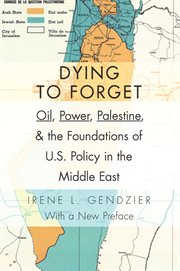Nonfiction
eBook
Details
PUBLISHED
DESCRIPTION
1 online resource
ISBN/ISSN
LANGUAGE
NOTES
In her groundbreaking analysis of the origins and evolution of U. S. policy toward the Middle East from 1945 to 1949, Irene L. Gendzier presents incontrovertible evidence that oil politics played a significant role in the founding of Israel, the policy adopted by the United States toward Palestinians, and subsequent U. S. involvement in the region. Consulting declassified U. S. government sources, as well as papers in the H. S. Truman Library, Gendzier uncovers little-known features of U. S. involvement in the region, including significant exchanges in the winter and spring of 1948 between the director of the Oil and Gas Division of the Interior Department and the representative of the Jewish Agency in the United States, months before Israel's independence and recognition by President Truman. She also shows that U. S. consuls and representatives abroad informed State Department officials, including the Secretary of State and the President, of the deleterious consequences of partition in Palestine. In documenting this dimension of U. S. policy, her work complements that of Palestinian historians as well as Israel's "New Historians" of 1948. The attempt to reconsider partition and replace it with a UN trusteeship for Palestine failed, however, jettisoned by Israel's declaration of independence. The results altered the regional balance of power and Washington's calculations of policy toward the new state. Prior to that, as Gendzier's work reveals, the U. S. endorsed the repatriation of Palestinian refugees in accord with UNGA Res 194 of Dec. 11, 1948, in addition to the resolution of territorial claims, the definition of boundaries, and the internationalization of Jerusalem. Yet instead of implementing the resolutions U. S. officials insisted were key to resolving the conflict, the United States deferred to Israel to assure its pro-Western support in the protection of U. S. oil interests in the Middle East
Mode of access: World Wide Web







